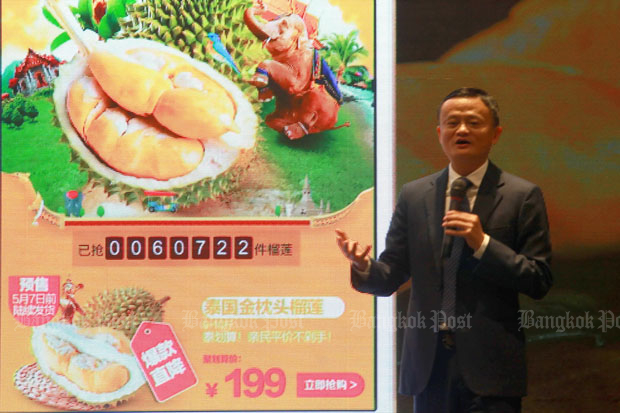
Alibaba supremo Jack Ma has suggested that the group's investment in Thailand will be at least US$3 billion (93.6 billion baht) over the next five years as the Chinese e-commerce giant seeks to capitalise on adoption of its platform and financial services by farmers and other underserved people.
Asked what the company's total investment in the country would be in the next five years, the executive chairman and co-founder responded: "I told my CEO, don't even talk about investments of less than $3 billion. Today's investment [of 11 billion baht] is only the first stage, and this is a long-term commitment. We're very excited about the Eastern Economic Corridor (EEC) and Thailand 4.0."
Alibaba signed memorandums of understanding Thursday with several Thai governmental agencies for a total of 11 billion baht. The investment aims to encourage Thai farmers and small and medium-sized enterprises (SMEs) to sell their products on the platform, promote Thailand's tourism industry and develop a "smart digital hub" in the EEC, though details of this last project were not discussed.
"Aside from e-commerce, we are eyeing tailor-made tourism, logistics and financial services opportunities in Thailand," Mr Ma said.
The investment is the latest in a list of moves calculated to strengthen the Chinese titan's position in Southeast Asia. Last month, Alibaba announced it would double its investment in regional e-commerce firm Lazada to $4 billion.
Last year, close to 1.3% of China's workforce was employed in e-commerce, and this is not a purely urban phenomenon. More than 1,500 villages around China supplement farming income by selling more than $1.6 million a year through Alibaba's Taobao marketplace, and more than 10% of the population is engaged in e-commerce activities.
A similar model would let Thai farmers move towards selling higher-margin agricultural products, like organic fruits and vegetables, abroad instead of producing commodities solely for local consumption.
"In the near future, 80% of SMEs will be operating globally through online platforms," Mr Ma said. "Companies that operate only locally will find it very hard to thrive."
Cross-border trade has been a constant of Thailand's e-commerce ecosystem for years now, as scores of entrepreneurs import products purchased on Chinese platforms to sell in the Thai market.
Now, Thai products are rapidly scaling abroad via Chinese platforms. In the past two days, more than 60,000 Thai durians have sold through Alibaba's Tmall.com. The company inaugurated the Thai Rice Flagship Store at Tmall.
Moving forward, rice and other oversupplied Thai agricultural products will find a place China, Mr Ma said. "China will import more than $8 trillion a year in the next five years," he added.
On the one hand, China has 300 million middle-class people able to afford Thai specialty products, and that number will grow to 500 million in the next 10-15 years, Mr Ma said. It makes sense to scale the company's offerings in Thailand, which already receives more than 10 million Chinese tourists a year.
Doing business through online platforms can also give farmers and SMEs the scale and credibility to access financing. Financial services have been an integral part of Alibaba's strategy for close to 15 years.
In China, subsidiary Alipay has a 53% stake in the Chinese market, according to consulting firm Analysys International. In Thailand, the company acquired a 20% share in CP-owned Ascend Corp, an e-wallet and microloan service for underserved segments of the population.
Getting cosy with government
The recent ascension of Lucy Peng, former chairman of Ant Financial, to the leadership of Alibaba subsidiary Lazada, may signal a desire to accelerate the company's e-commerce and financial offerings in the region.
Mr Ma parried accusations that his investments in Malaysia and Thailand were a way of furthering his electronic world trade platform and helping it acquire a nearly monopolistic position in the region. The platform, described by Alibaba as a complement to the World Trade Organization, seeks to "simplify regulations, lower barriers to entry to new markets and provide small businesses with more accessible financing".
"We don't have the capability to monopolise trade, and it is impossible to monopolise a digital market," Mr Ma said. "I have been suspected and criticised for the last 19 years. You cannot escape criticism in business.
"We are not going to occupy Thailand or take away jobs. We are interested in enabling entrepreneurs."
Alibaba is cosying up to the Thai government, just as accusations of possible monopoly are surfacing among regulators. Mr Ma denies that the company is seeking special treatment: "We are not asking for any privileged policies. Alibaba doesn't need privileges, but medium and small-size companies looking to export globally do."
Monopoly concerns
Pawoot Pongvitayapanu, president of the Thai E-commerce Association, said the government should do an impact analysis on the effects of Alibaba's investment, which will deepen the company's reach in online retail, payment and logistics.
Thai SMEs can export to China through online platforms, but they can also sell Chinese products in Thailand via Lazada. "A Chinese player monopoly is a concern for Thai manufacturers, distributors and retailers," Mr Pawoot said. "Local SMEs will have to compete with Chinese products sold online, which carry little tax and don't utilise middlemen."
Mr Pawoot said policymakers need to find a way to strengthen local SMEs and local e-commerce merchants. The Revenue Department's e-business tax policies are good for foreign e-commerce operators but hurtful for local online merchants who already pay corporate tax, he added.